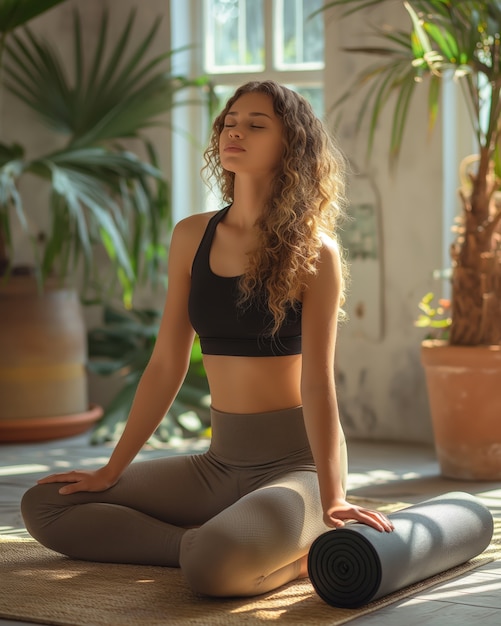
A yoga body isn’t just about flexible limbs; the ancient practice can improve memory, heart, and bone health, says Anna Magee.
Our nation is now very much into downward dogs and cat cows, spending an incredible £790 million annually on yoga classes and yoga mats.
Yoga has evolved with new variations like rage yoga, naked yoga, and even yoga with dogs or on paddle boards and horseback. Despite these quirky trends, the genuine benefits of yoga are increasingly supported by science.
Researchers at UCLA discovered that a three-month yoga and meditation course was more effective at reducing age-related brain decline than memory exercises. Moreover, other studies found yoga improved sleep quality in breast cancer survivors.
When former advertising executive Lucy Edge, 53, experienced deep depression, she turned to yoga instead of medication. She took a six-month career break, learned yoga in India, and returned feeling content and happier, although she didn’t achieve the stereotypical yoga body. Lucy has written three books about yoga and established Yoga Meds, a section on her website that lists over 300 clinical trials showcasing yoga’s benefits for conditions like arthritis, insomnia, and obesity.
If your memory training has been limited to activities like crossword puzzles and Sudoku, it might be time to incorporate the warrior pose into your routine. The UCLA research involved brain scans and memory tests over 12 weeks, finding that participants who practiced yoga and meditation had better spatial and visual memory improvements, reduced depression and anxiety, and increased stress resilience.
Dr. Clare Walton of the Alzheimer’s Society suggests further research into the benefits of yoga and meditation, especially for maintaining heart and brain health as we age.
To benefit from yoga, an hour of Kundalini yoga weekly could suffice. This gentle form of yoga includes breathing techniques, meditation, and mantra chanting, which may feel awkward at first but can be easier than other meditation forms. Study participants also practiced Kirtan Kriya, a type of meditation involving chanting, hand movements, and visualizing light, for 20 minutes daily.
While walking or jogging is often recommended for heart health, yoga might be an equally effective and gentler alternative. A 2014 systematic review published in the European Journal of Preventative Cardiology indicated that yoga could reduce heart disease risk as much as brisk walking. Yoga reduces stress, which is known to increase blood pressure and heart rate, thus lowering the risk of heart disease.
Dr. Mike Knapton of the British Heart Foundation notes that yoga is beneficial for emotional health, anxiety, stress, and depression, which are common in cardiac patients. Yoga has been linked to improvements in blood pressure, cholesterol, and weight, all of which are heart disease risk factors.
Yoga teacher Charlotte Watts has created a series of gentle yoga poses for stress reduction, which are perfect for beginners. Restorative yoga, where poses are supported by bolsters and cushions and held for up to 12 minutes, is another excellent way to decrease stress.
Musculoskeletal physiotherapist and yoga teacher Sarah Shone integrated yoga into a rehabilitation program for back pain, with 87% of participants reporting pain reduction. Yoga and stretching are recommended by NICE guidelines for lower back pain. Shone aims to train more physiotherapists in yoga for clinical use with older adults.
Yoga can also aid in preventing incontinence by targeting pelvic floor muscles and increasing bone density due to its weight-bearing nature. It can be adapted for accessibility.
If you are beginning yoga, choose a gentle style like Hatha or Iyengar and inform your teacher of any health conditions. If you have back pain, consult your doctor about subsidized yoga courses available through exercise referral schemes.
Good yoga props can enhance your practice. When choosing a yoga mat, consider its intended location, portability if you’ll be transporting it, and its length, especially if you’re tall. A thicker mat provides extra cushioning, beneficial for joint protection.
Healthista recommends Valka Yoga’s Elephant Cork Yoga Mat, which costs £69.95. This eco-friendly mat is renewable and recyclable, providing excellent grip and comfort due to its 3mm thickness. Cork is naturally antimicrobial and odour-resistant, perfect for hot yoga. Each mat comes with a carrying strap and with a 15-day money-back guarantee, along with a one-year replacement warranty.
The matching Valka Yoga block, priced at £19.95, can help with more challenging poses and offers better grip and stability than foam blocks.
If you’re not very flexible, don’t worry—yoga can still help. Explore different styles like Yin or Restorative yoga, Vinyasa Flow, Iyengar yoga, Anusara yoga, or Yoga Therapy to find what suits you best. Each variation can accommodate beginners and those with specific needs.
Whether you’re new or experienced in yoga, the right equipment and style can enhance your practice significantly.